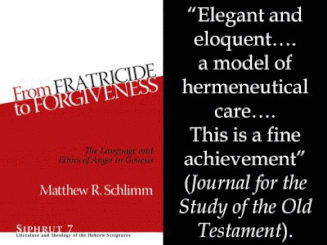
Every patriarch and many of the matriarchs of Genesis have significant encounters with anger.
This emotion has important ethical implications. Anger arises from sensing that a wrongdoing has occurred. Yet, it can lead to more wrongdoing.
I examine this emotion and what Genesis says about it in my first book. Here's an overview:
Part 1. The Language of Anger. These five chapters draw on cognitive linguistics to examine how we can best understand the way anger is conceived and articulated in the Hebrew Bible.
Part 2. Daybreak after the Dim Glow of the Enlightenment: Approaching the Ethics of Genesis. These two chapters argue that ethics in the Old Testament stand in sharp contrast to modernity's conceptions of right and wrong. It explores positive ways that a text like Genesis can provide moral instruction.
Part 3. In Search of a Brother's Keeper: Anger and Its Antitheses in Genesis. These five chapters provide close readings of the dozen texts in Genesis that describe characters as angry with one another. Starting with the fratricide committed by Cain, this part culminates by examining the forgiveness offered by Joseph.
This emotion has important ethical implications. Anger arises from sensing that a wrongdoing has occurred. Yet, it can lead to more wrongdoing.
I examine this emotion and what Genesis says about it in my first book. Here's an overview:
Part 1. The Language of Anger. These five chapters draw on cognitive linguistics to examine how we can best understand the way anger is conceived and articulated in the Hebrew Bible.
Part 2. Daybreak after the Dim Glow of the Enlightenment: Approaching the Ethics of Genesis. These two chapters argue that ethics in the Old Testament stand in sharp contrast to modernity's conceptions of right and wrong. It explores positive ways that a text like Genesis can provide moral instruction.
Part 3. In Search of a Brother's Keeper: Anger and Its Antitheses in Genesis. These five chapters provide close readings of the dozen texts in Genesis that describe characters as angry with one another. Starting with the fratricide committed by Cain, this part culminates by examining the forgiveness offered by Joseph.